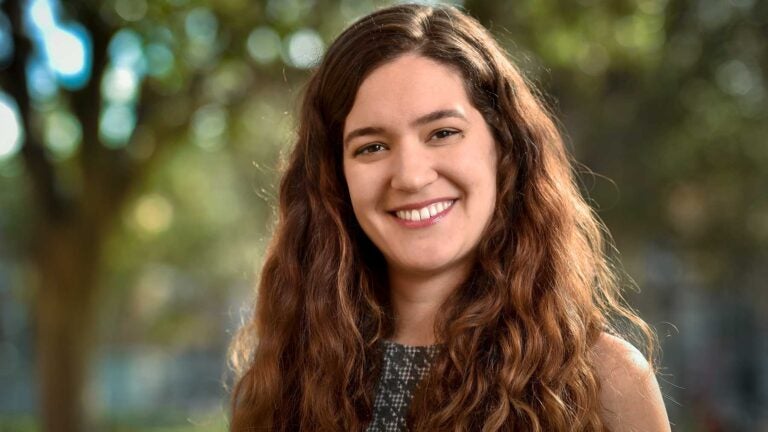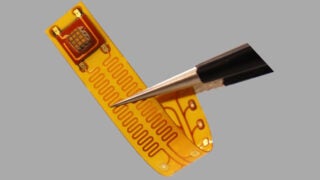
Amanda Mason has a PhD in developmental and stem cell biology. (USC Photo/Gus Ruelas)
The basics of biotech and why it matters at USC
Strategist Amanda Mason talks about the university’s many labs looking for cures to cancer, Alzheimer’s, diabetes and more
Amanda Mason joined the Keck School of Medicine of USC this fall as assistant director for strategy and planning for the newly formed Medicine, Engineering, Science and Humanities Academy. The interdisciplinary academy will serve as a hub for biomedical research innovation and collaboration at USC.
Mason, who has a PhD in developmental and stem cell biology, explained the basics of biotechnology, one of the fastest-growing sectors in the global economy, and why it matters.
What is biotech?
As the name suggests, biotechnology is just technology that is based on biology. Biotech uses the cellular and molecular processes that occur in living organisms to create products that treat diseases, improve agriculture and reduce our environmental footprint.
Modern biotechnology provides breakthrough products and technologies to combat debilitating and rare diseases, reduce our environmental footprint, feed the hungry, use less and cleaner energy, and have safer, cleaner and more efficient industrial manufacturing processes.
How is it already part of our everyday lives?
Biotech seems like a brand-new idea, but it is actually quite old; humans have used the cellular/molecular processes of bacteria and other microorganisms for thousands of years — for example, in bread, cheese, beer and wine. Modern biotech can be seen in hundreds of treatments for diseases, including many forms of cancer, as well as several vaccines which protect against disease. In addition, modern biotech is used to improve crop yields and make crops more resistant to insects and other pests. Biotech is also used to create biofuels, which can be used as an alternative to polluting fossil fuels.
Why is there such a buzz about this field?
The field of biotechnology has recently exploded. Projects like the Human Genome Project have given us more understanding than ever of how cells work. As our understanding grows, so does our ability to harness cellular processes to create new medicines and diagnostics [tests that help identify what disease a patient has]. There are currently over 300 FDA-approved drugs that are biotechnology products.
What is USC doing on this front and why?
USC has hundreds of research labs looking for cures to a huge variety of diseases, from cancers to HIV to Alzheimer’s disease to diabetes. Many of the labs are using biotechnology in the search for the next cure. Every year, USC researchers file dozens of patents on inventions related to the treatment of human diseases, and many of these patents have helped form the basis for a successful treatment.
How could biotech research improve lives?
Biotech research has yielded drugs for previously incurable diseases, as well as drugs that work much better than the old alternatives. For example, Herceptin is a drug for breast cancer that was developed using biotechnology. It treats a specific form of breast cancer with a specific type of mutation. Before Herceptin was available, women with these mutations had low success rates of chemotherapy. Now, with Herceptin, women with this mutation have a much better chance for survival. There are hundreds of similar stories of biotech drugs in a variety of diseases.
What jobs can young people get in this field?
Lab researchers are the ones using biotech every day at work. Lab researchers can include university professors [who usually have a PhD in their field], graduate students [who are working on a PhD] and technicians [who usually have a two-year or four-year undergraduate degree in science]. Many professions in health care also use biotechnology. For example, nurses and doctors administer drugs, including those made with biotechnology, to patients.
What of your own experiences have made you appreciate this field?
I have a PhD in stem cell biology and my PhD thesis project was using stem cells to search for treatments for dementia. So I have used biotechnology firsthand. I was inspired to pursue a PhD in biology when I was in middle school and learned about DNA. When I was taught that DNA encodes all of the information a cell needs to grow, divide and create a whole person [or animal, or plant or bacterium …], I was really inspired to learn more. Ever since then, I have been interested in biology and biotechnology. I know that biotech has already changed millions of lives and has the potential to change millions more. In my new job at USC, I will help promote biotech research at USC and hopefully see new inventions in the realm of biotech benefit the university as well as the community at large.
What does the future of biotech look like?
One of the most exciting things about biotech is that it enables the creation of personalized medicines. Doctors can choose the best treatment based on the individual patient, or sometimes even create a custom treatment for that one patient. In the future, more and more personalized treatments will become available that will be tailor-made to each patient and therefore more effective.



